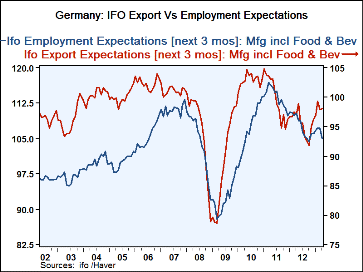 Global| Apr 25 2013
Global| Apr 25 2013German IFO reading drops
Summary
The details for the German IFO index show that in terms of current conditions deceleration is rampant across all sectors of the German economy except for retailing. The German retailing sector index edged higher from 5.8 in March to a [...]
 The details for the German IFO index show that in terms of current conditions deceleration is rampant across all sectors of the German economy except for retailing. The German retailing sector index edged higher from 5.8 in March to a reading of 6.2 in April. However, the big surprise was a huge drop in services where the index fell from 27.9 in March to 15.1 in April. This is a very sharp step back in current conditions. Out of 143 changes in the history of this series this month's drop ranks as the third largest drop back to early 2001 (the 3rd largest drop out of 141).
The details for the German IFO index show that in terms of current conditions deceleration is rampant across all sectors of the German economy except for retailing. The German retailing sector index edged higher from 5.8 in March to a reading of 6.2 in April. However, the big surprise was a huge drop in services where the index fell from 27.9 in March to 15.1 in April. This is a very sharp step back in current conditions. Out of 143 changes in the history of this series this month's drop ranks as the third largest drop back to early 2001 (the 3rd largest drop out of 141).
Looking at expectations, the deterioration on the month is similarly widespread. One caveat, to complete the calculations in the table we are using for the April value for services expectations as its March value as April is not available at this time. We are wary of plugging in an unchanged value for expectations because of the sharp setback to current conditions. Nonetheless here is the breakdown for the rest of the sectors. Overall expectations fell to -0.5, a negative reading, from +3.6 in April. The manufacturing index posted a 1.7 reading in April down sharply from 6.4 in March. The construction sector fell from 9.7 to 5.1. Wholesaling, which already was negative at -4.5 has fallen to -7 in April. Retailing which previously was at -5.7 has slipped to -8.1.
The setback in Germany for current conditions as well as for expectations is broad-based and the setbacks are relatively severe.
Looking at current conditions, with its sharp drop this month, services is at the weakest position in its queue, slightly above the 50th percentile just barely above its median which lies at a level of 50. Manufacturing is the next weakest sector at the relatively weakest position in its queue at the 52.7 percentile. Wholesaling has a firm reading, as it stands in the 67.9 percentile, near to the 72.9 percentile reading for the aggregate, all sectors. Relatively strong is the construction sector at the 98.5 percentile mark and retailing at the 85.5 percentile mark.
Looking at expectations the readings are uniformly lower in terms of their relative standing. The queue standing for the overall all sector index is in its 57th percentile. Manufacturing is the weakest in its 45th percentile, retailing is next weakest at the 52nd percentile with wholesaling right behind it at nearly the 57th percentile. Once again construction is the strongest sector sitting in its 98 percentile. This month we plug services in at its March value and at the 67th percentile but we are using the level for March rather than a new reading for April.
Currently the German economy is under some strain. The chart we feature at the top is a chart that shows that while German expectations for exports continue to be fairly strong, expectations for employment continue to drift lower. This sort of divergence indicates an inconsistency in the outlook for the economy and its impact.
What we see in the details of the IFO is evidence of further creeping weakness for the German economy. Although Germany's readings continue to be stronger than for the rest of the zone there is not much good news in the IFO report for this month.

Robert Brusca
AuthorMore in Author Profile »Robert A. Brusca is Chief Economist of Fact and Opinion Economics, a consulting firm he founded in Manhattan. He has been an economist on Wall Street for over 25 years. He has visited central banking and large institutional clients in over 30 countries in his career as an economist. Mr. Brusca was a Divisional Research Chief at the Federal Reserve Bank of NY (Chief of the International Financial markets Division), a Fed Watcher at Irving Trust and Chief Economist at Nikko Securities International. He is widely quoted and appears in various media. Mr. Brusca holds an MA and Ph.D. in economics from Michigan State University and a BA in Economics from the University of Michigan. His research pursues his strong interests in non aligned policy economics as well as international economics. FAO Economics’ research targets investors to assist them in making better investment decisions in stocks, bonds and in a variety of international assets. The company does not manage money and has no conflicts in giving economic advice.






